
|
Astronomy Picture Of the Day (APOD)
21.12.2005
Does the Sun always rise in the same direction? No. As the seasons change, the direction toward the rising Sun will change, too. The Sun will always rise and set furthest to the south during the day of Winter Solstice, and furthest to the north during Summer Solstice.
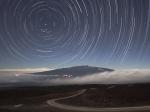 Star Trails Above Mauna Kea
Star Trails Above Mauna Kea
20.12.2005
Is there a road to the stars? Possibly there are many, but the physical road pictured above leads up to the top of a dormant volcano that is a premier spot on planet Earth for observing stars and astronomical phenomena.
 Thin Rings Around Polarized Saturn
Thin Rings Around Polarized Saturn
19.12.2005
How thin are the rings of Saturn? Brightness measurements from different angles have shown Saturn's rings to be about one kilometer thick, making them many times thinner, in relative proportion, than a razor blade. This thinness sometimes appears in dramatic fashion during an image taken nearly along the ring plane.
 M83: The Southern Pinwheel Galaxy from VLT
M83: The Southern Pinwheel Galaxy from VLT
18.12.2005
M83 is one of the closest and brightest spiral galaxies on the sky. Visible with binoculars in the constellation of Hydra, majestic spiral arms have prompted its nickname as the Southern Pinwheel. Although discovered...
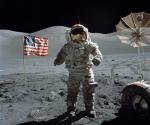 Apollo 17: Last on the Moon
Apollo 17: Last on the Moon
17.12.2005
In December of 1972, Apollo 17 astronauts Eugene Cernan and Harrison Schmitt spent about 75 hours on the Moon, in the Taurus-Littrow valley, while colleague Ronald Evans orbited overhead. Near the beginning of their...
16.12.2005
Scroll right and gaze through the dusty plane of our Milky Way Galaxy in infrared light. The cosmic panorama is courtesy of the Galactic Legacy Infrared Mid-Plane Survey Extraordinaire (GLIMPSE) project and the Spitzer Space Telescope.
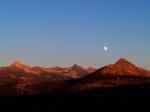 Autumn Moon Encore
Autumn Moon Encore
15.12.2005
Near its northernmost declination, tonight's Full Moon will be a special one, arcing high in northern hemisphere skies. But a Full Moon won't occur on this calendar date for another 19 years, a period known as the lunar Metonic cycle.
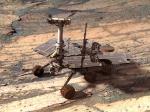 A Digital Opportunity Rover on Mars
A Digital Opportunity Rover on Mars
14.12.2005
If you could see one of the robot rovers currently rolling across Mars, what would it look like? To gain this perspective useful in planning explorations, the above synthetic image was produced digitally. Above...
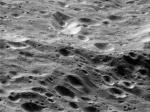 620 Kilometers Above Rhea
620 Kilometers Above Rhea
13.12.2005
What does the surface of Saturn's moon Rhea look like? To help find out, the robot Cassini spacecraft currently orbiting Saturn was directed to fly right past the second largest moon of the gas giant planet late last month.
 30 Doradus: The Tarantula Zone
30 Doradus: The Tarantula Zone
12.12.2005
The Tarantula Nebula is more than 1,000 light-years across - a giant emission nebula within our neighboring galaxy the Large Magellanic Cloud. Inside this cosmic arachnid lies a central young cluster of massivestars, cataloged as R136, whose intense radiation and strong winds have helped energize the nebular glow and shape the spidery filaments.
|
January February March April May June July August September October November December |
|||||||||||||||||||||||||||||||||||||||||||||||||